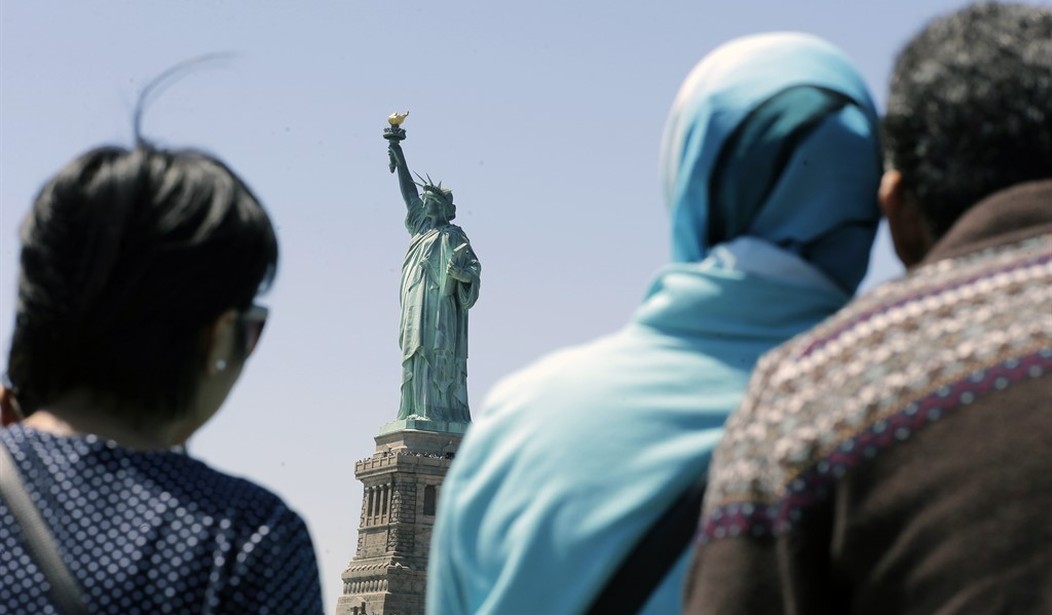The administration rolled out its new immigration policy at the White House Wednesday during a week when nothing has gone well for the president. President Donald Trump has failed at health care reform. His poll numbers have slipped to 33 percent approval in a new Quinnipiac poll and 36 percent in Gallup's latest. And Congress forced the president to do something he's been avoiding for months: punish Russia for its meddling in last year's presidential election by sending him a veto-proof Russia sanctions bill. No wonder the president tried to change the subject by trotting out his favorite scapegoat.
Immigrants make easy scapegoats, a truth the president exploited all the way from Trump Tower to the Oval Office. First, it was illegal immigrants, whom the president blamed for a nonexistent spike in violent crime in the United States. Now it is the legal immigration system in general, which the administration is blaming for lowering wages for American workers and burdening the welfare system. But immigrants, especially those here legally, aren't the problem, and cutting their numbers in half will do great harm to the economy.
The bill the president has thrown his weight behind -- sponsored by Republican senators Tom Cotton of Arkansas and David Perdue of Georgia -- would dramatically alter U.S. immigration policy, shifting the emphasis from family-reunification to one that is skills-based. There is nothing wrong with moving to a more skills-based approach; I've advocated doing so for years. The problem is in the way that this bill defines skills and the hubris of thinking government bureaucrats know better than employers which kinds of workers America needs and how many.
Even though our current system gives priority to immigrants who already have family living in the United States, those admitted clearly bring certain skills with them. As it happens, the immigrant flow is bifurcated into two streams: low-skilled workers, largely from Latin America, and high-skilled workers, mostly from Asia. However, there are plenty of exceptions. Some 6 percent of Mexican immigrants in 2014 had a college degree or higher, and 15 percent of Asian immigrants had less than a high school degree. But both these major immigrant streams fill gaps in the U.S. labor force.
Recommended
We have too few Americans graduating with degrees in science, technology, engineering and math to fill our needs in the STEM fields, and too many Americans with at least a high school degree who don't want careers at a meat-packing plant or picking produce. Yes, we also have American-born high school dropouts who have left the labor force and who could take those jobs. But how can we force them to do so? And should we blame employers for wanting to hire a foreign-born worker who sees a low-skilled job as his or her American Dream and will show up on time and put in a full day's work over an American dropout who has no track record of doing either?
The immediate effect of this proposed policy change will be to reduce the number of immigrants from Latin America and to cut immigration overall, but its more lasting impact will be on making both the U.S. economy and population smaller. The impact on GDP will be large. A reduction in immigration of this magnitude would negatively affect labor growth as well. The Congressional Budget Office already predicts a decline in the growth of the labor force over the next 10 years, which will mean that GDP will grow at only about 1.8 percent -- and those numbers were calculated before the Trump proposal. Replacing productive foreign workers with Americans who've dropped out of the labor force, even if it were possible to do so, wouldn't raise productivity, which means any hike in wages will be inflationary. Employers faced with less-productive workers demanding higher wages will move jobs out of the country or mechanize them out of existence.
The better solution is to move to a market-based legal immigration system that lets employers decide what kind of workers they need. Blaming immigrants for stealing jobs and depressing wages is just one more way President Trump draws attention away from his own lack of leadership.

























Join the conversation as a VIP Member